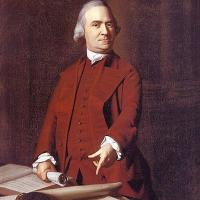The Rights' of the Colonists
The text of Samual Adams' The Rights of the Colonists directly derives from the work of John Locke. Adams wrote, "...the grand end of civil government, from the very nature of its institution, is for the support, protection, and defense of those very rights; the principal of which, as is before observed, are Life, Liberty, and Property."1 Locke’s philosophy centered on the idea that government is meant to protect people’s inalienable rights—specifically to life, liberty, and property. Here, Adams demonstrates that the American colonists’ resistance against the British Crown was derived from the principles Locke articulated.
Adams also utilizes early modern philosophy’s emphasis on the consent of the governed and Locke’s justification of resistance against the government to defend the colonists’ demands. Since people enter a government voluntarily and have the previously established inalienable rights, the people can likewise dissolve the original compact when these rights are infringed upon. Adams wrote, “When men enter into society, it is by voluntary consent; and they have a right to demand and insist upon the performance of such conditions and previous limitation as form an equitable original compact.”2
These instances demonstrate that the American colonists utilized language nearly identical to Locke to justify their resistance to British rule. At this point, the colonists were not yet committed to rebellion but wanted to reaffirm the rights they held as citizens of the Crown. Thus, they chose to appeal to an English philosopher whose work had already gained traction in the United Kingdom.
1. Adams, Samuel, and Alfred Whital Stern. Collection Of Lincolniana. ... The Rights of the Colonists. [Boston: Directors of the Old South Work, 1906] Pdf. https://www.loc.gov/item/20020841/.
2. ibid.
